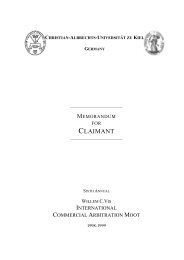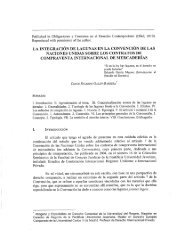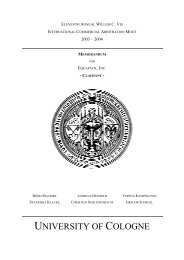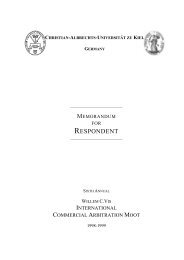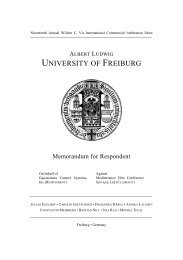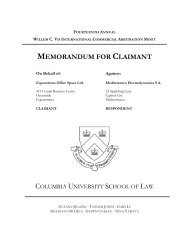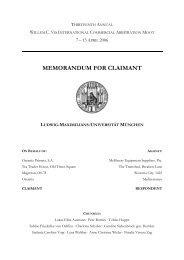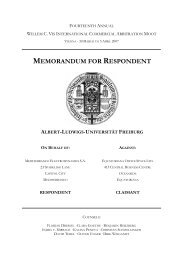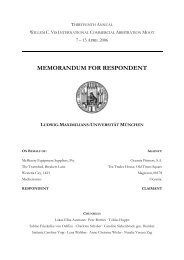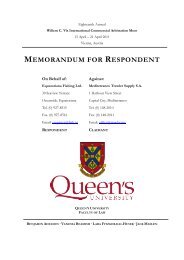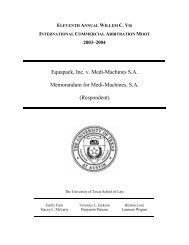MEMORANDUM FOR RESPONDENT - CISG Database
MEMORANDUM FOR RESPONDENT - CISG Database
MEMORANDUM FOR RESPONDENT - CISG Database
Create successful ePaper yourself
Turn your PDF publications into a flip-book with our unique Google optimized e-Paper software.
ARGUMENTS<br />
I. THIS TRIBUNAL HAS NO JURISDICTION TO RULE ON THE MERITS OF<br />
THE DISPUTE.<br />
1. Although the Respondent had participated in the constitution of this Tribunal, it is not<br />
precluded from challenging the latter’s jurisdiction [A]. This Tribunal was instituted under<br />
the CICA Rules and thus has no jurisdiction because the parties only had a common intention<br />
to submit to ad hoc arbitration [B]. Only a new ad hoc tribunal not constituted with the<br />
participation of the CICA would have jurisdiction to hear the parties’ dispute [C].<br />
A. THE <strong>RESPONDENT</strong> IS NOT BARRED FROM CHALLENGING THIS TRIBUNAL’S<br />
JURISDICTION.<br />
2. Despite participating in the constitution of this Tribunal, the Respondent has<br />
consistently challenged its jurisdiction [Letter from Fasttrack conveying Answer; Answer,<br />
para. 14-17, 24; Procedural Order No. 1, para. 4]. The seat of the arbitration, Danubia, has<br />
enacted the UNCITRAL Model Law (“Model Law”), which is the applicable procedural law<br />
[Statement of Claim, para. 21]. Article 16(2) of the Model Law states that a party is not<br />
precluded from raising a plea that the Tribunal does not have jurisdiction by the fact that he<br />
has participated in the appointment of an arbitrator [Holtzmann/Neuhaus, p. 480].<br />
B. THE ARBITRATION AGREEMENT CAN ONLY PROVIDE <strong>FOR</strong> AD HOC ARBITRATION<br />
BECAUSE THERE IS NO COMMON INTENTION TO ARBITRATE INSTITUTIONALLY.<br />
3. The parties’ common intention to arbitrate under the specified circumstances is a<br />
fundamental condition for the enforcement of an arbitration agreement [1]. The arbitration<br />
agreement evinces no common intention for institutional arbitration under the auspices of the<br />
CICA [2]. Further, the arbitration agreement can only be interpreted to show a common<br />
intention to submit to ad hoc arbitration [3]. Consequently, this Tribunal should decline to<br />
enforce the arbitration agreement and hold that it has no jurisdiction to resolve this dispute.<br />
1. The essence of an arbitration agreement is the parties’ common<br />
intention to arbitrate under specified conditions.<br />
4. The contract between the parties is the fundamental constituent of international<br />
arbitration [Gaillard/Savage, para. 46]. As a contract, the arbitrators’ power to resolve a<br />
3





